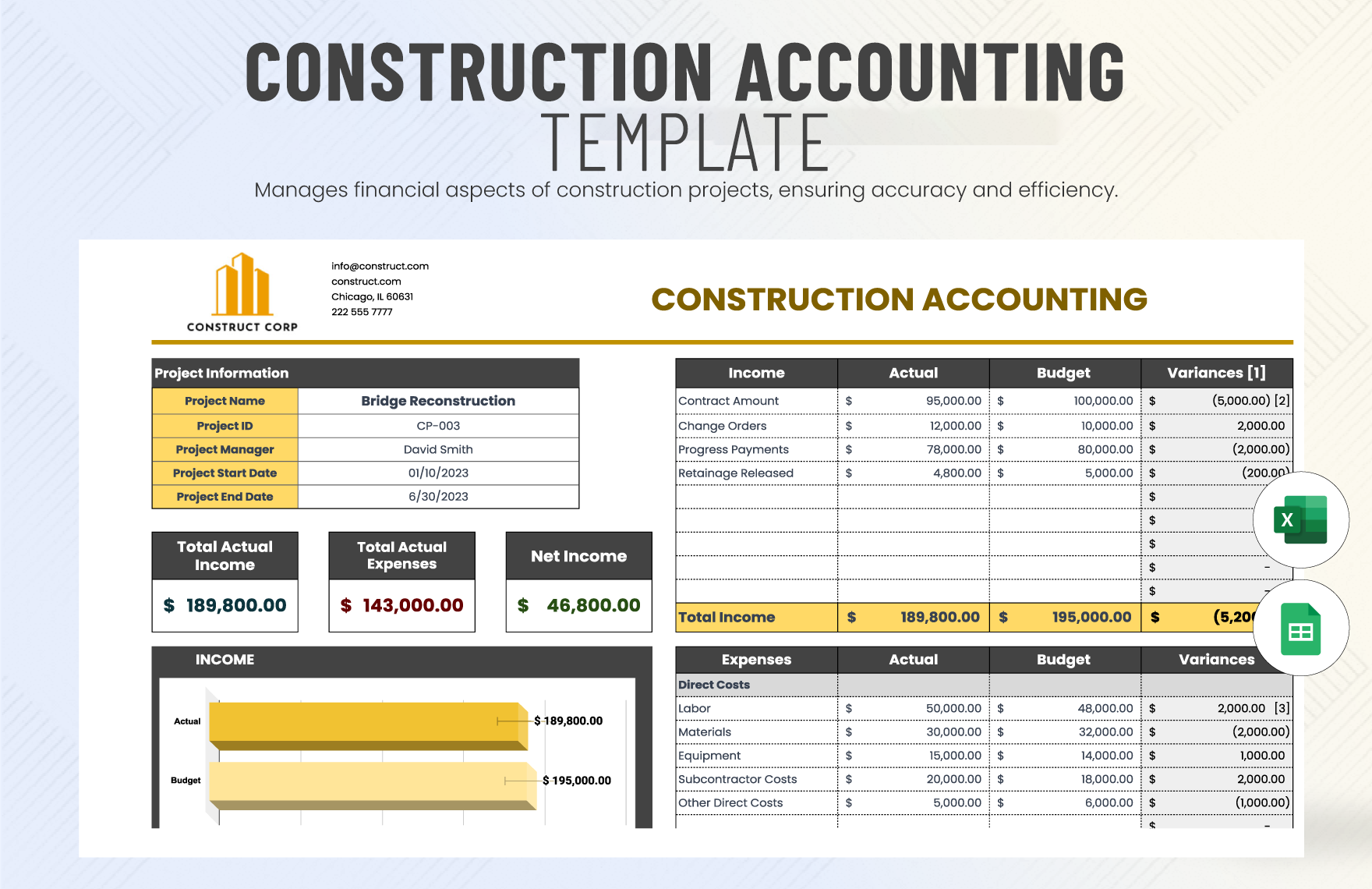Trick Solutions Offered in Building And Construction Audit to Enhance Financial Oversight
In the world of building audit, key services such as job expense evaluation, budget plan monitoring, and cash flow evaluation play an essential duty in boosting economic oversight. Understanding these subtleties can significantly influence the effectiveness of monetary oversight in building jobs.
Job Cost Estimation
Effective project cost estimate is a critical component of successful building and construction accounting solutions, as it straight impacts budgeting and financial planning (construction accounting). Accurate price price quotes give a detailed introduction of the monetary requirements for a construction task, enabling stakeholders to make enlightened choices relating to resource allocation and task expediency
A complete expense estimation process encompasses numerous aspects, consisting of labor, products, devices, expenses, and backups. By evaluating historical data and present market patterns, building and construction accounting professionals can establish realistic quotes that show true task costs. This logical technique not only help in securing funding but additionally enhances openness and responsibility amongst all celebrations entailed.
Furthermore, precise expense estimate serves as a foundation for monitoring and regulating expenses throughout the job's lifecycle. By establishing a clear baseline, building and construction accountants can identify inconsistencies in between estimated and real costs, enabling prompt adjustments and treatments.
Inevitably, effective job price evaluation not just facilitates smoother job implementation but likewise strengthens the total economic health of building and construction businesses, ensuring they stay affordable in an increasingly dynamic industry. This calculated strategy underscores the value of skilled professionals in providing dependable and accurate cost quotes.
Budget Plan Monitoring
In the realm of building bookkeeping solutions, spending plan monitoring plays a pivotal role in guaranteeing that jobs stay economically feasible and on the right track. Efficient budget plan administration includes the methodical preparation, tracking, and managing of job expenses to straighten with financial purposes. It starts with the production of a thorough spending plan that precisely shows the expected costs of labor, products, devices, and overhead based upon detailed task expense evaluation.
When the budget plan is developed, recurring tracking is vital. This includes regular analyses of real expenditures against the allocated figures, permitting prompt recognition of inconsistencies. By executing devices and software program tailored for construction audit, project managers can create real-time reports that facilitate educated decision-making.
Furthermore, proactive spending plan administration enables stakeholders to change financial appropriations and resources as essential, advertising flexibility in action to unexpected obstacles. This versatility is vital in the building industry, where job scopes can often transform. Eventually, durable budget plan monitoring not only boosts economic liability yet additionally improves total project efficiency, ensuring effective conclusion within the assigned economic parameters.
Capital Analysis
Capital analysis acts as an essential component of building audit, enabling job supervisors to keep a clear understanding of the inflow and outflow of funds throughout the project lifecycle. This analytical procedure permits the recognition of potential money lacks or excess, encouraging supervisors to make informed decisions concerning budgeting and source appropriation.
By meticulously tracking cash inflows from client repayments, finances, and various other revenue sources, along with keeping track of outflows such as labor, materials, and overhead costs, job managers can produce a detailed capital forecast - construction accounting. This forecast not only aids in forecasting future financial positions but also assists in identifying trends that might influence job feasibility
Routine capital evaluation assists in timely interventions, permitting task managers to address economic obstacles before they escalate. This aggressive technique can reduce threats connected with delayed settlements or unforeseen expenses, inevitably causing more effective job conclusions. Reliable money circulation management adds to maintaining solid relationships with subcontractors and vendors by ensuring timely settlements.
Essentially, cash money flow evaluation is an essential device in construction accountancy, driving financial stability and functional performance throughout the duration of building tasks.
Regulatory Compliance Assistance
Governing compliance support is crucial for building companies navigating the facility landscape of industry guidelines and criteria. The construction market goes through a myriad of neighborhood, state, and federal policies, consisting of security requirements, labor laws, and environmental standards. Non-compliance can lead to substantial fines, delays, and reputational damage.
A durable conformity support group helps firms stay notified concerning pertinent regulations and guarantees that they execute required plans and treatments. This consists of monitoring adjustments in regulation, giving training for employees, and conducting regular audits to assess compliance degrees. Construction accountants play a crucial role in this procedure, offering experience to interpret regulations and line up financial methods accordingly.
Furthermore, regulative compliance support incorporates the prep work and entry of needed documents, such as tax obligation filings and reporting for labor standards. By establishing a proactive conformity technique, building firms can reduce risks related to non-compliance, boost operational performance, and promote a culture of accountability.
Ultimately, effective governing conformity support not only safeguards a building and construction company's monetary health yet also reinforces its reputation in the sector, positioning it for lasting growth and success.

Financial Coverage and Insights
While navigating the intricacies of the construction market, exact financial coverage and insightful evaluation are essential for educated decision-making. Construction jobs usually include substantial capital expense and rising and fall costs, making it vital for stakeholders to have accessibility to clear and timely monetary information. Comprehensive financial records, consisting of earnings and loss statements, capital estimates, and equilibrium sheets, offer a picture of a firm's economic health and efficiency.
Moreover, tailored insights obtained from these records aid supervisors recognize trends, assess job earnings, and make calculated modifications to improve operational effectiveness. Secret efficiency signs (KPIs) certain to building and construction-- such as task margins, labor costs, and overhead ratios-- use beneficial criteria for assessing success and projecting future performance.
In addition, normal financial reporting enables compliance with contractual responsibilities and fosters transparency with stakeholders and investors. By leveraging advanced accounting software program and information analytics, building and construction firms can enhance their financial oversight, allowing them to browse uncertainties much more efficiently. Ultimately, robust economic coverage and actionable understandings empower check building and construction firms to make educated decisions that advertise development and sustainability in a highly competitive market.
Verdict

In the realm of construction bookkeeping, crucial solutions such as task price estimation, budget management, and money circulation evaluation play a crucial role in improving monetary oversight. Eventually, robust budget plan administration not just boosts monetary responsibility however likewise boosts overall project efficiency, ensuring effective conclusion within the alloted economic criteria.
